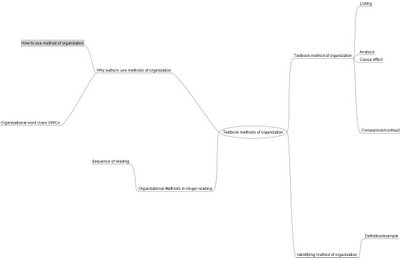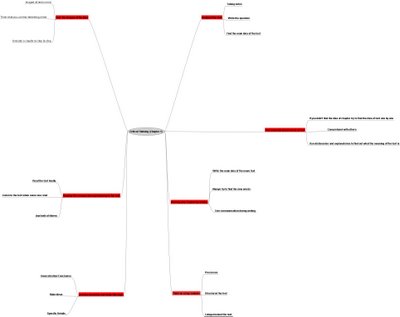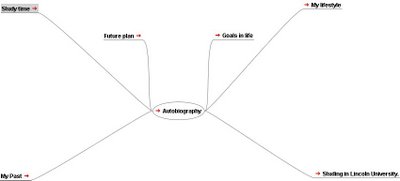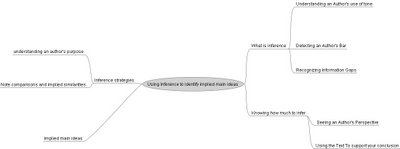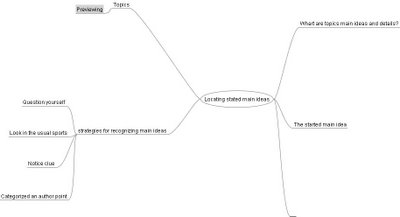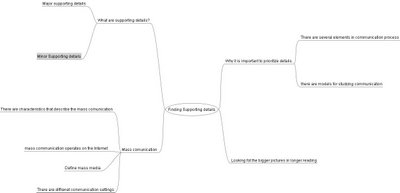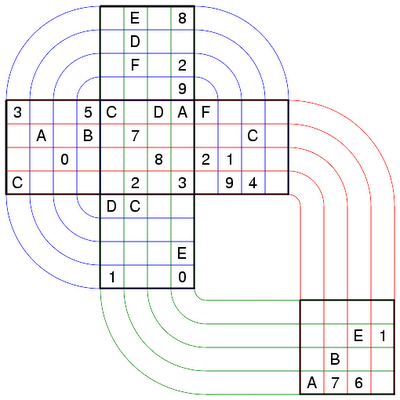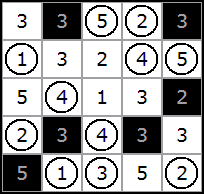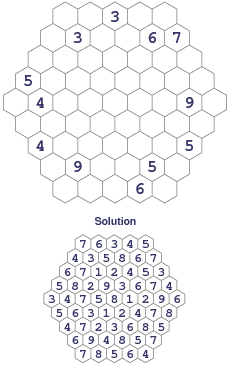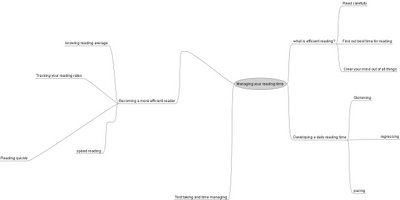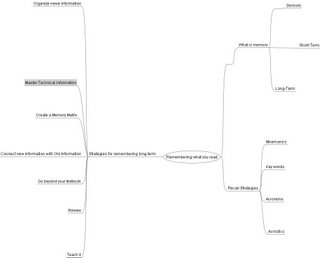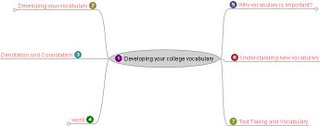
Monday, October 30, 2006
Friday, October 27, 2006
E75
Chapter 9
Using preview, study-read, and review (psr) strategies.
The PRS techniques (preview, study-road, and review) require that you question yourself before, during, and after you read. It encourage you to practice in a reader-author conversation rather that to read passively. In this conversation, you assess what the author says and decide if it makes sense to you. You also add what you know to the conversation by recalling related information. This dialogue, this active participation, helps you understand and remember textbook material.
The PSR techniques also require you to respond to reading by writing in your journal. Commenting in writing helps you digest and understand an author’s ideas and articulate your own. By identifying exactly where you became confused in a reading, you can return to that point and reread the relevant section of text. This will help you to understand the material on your own.
Chapter 9
Using preview, study-read, and review (psr) strategies.
The PRS techniques (preview, study-road, and review) require that you question yourself before, during, and after you read. It encourage you to practice in a reader-author conversation rather that to read passively. In this conversation, you assess what the author says and decide if it makes sense to you. You also add what you know to the conversation by recalling related information. This dialogue, this active participation, helps you understand and remember textbook material.
The PSR techniques also require you to respond to reading by writing in your journal. Commenting in writing helps you digest and understand an author’s ideas and articulate your own. By identifying exactly where you became confused in a reading, you can return to that point and reread the relevant section of text. This will help you to understand the material on your own.
E75
Chapter 8
Textbook Methods of Organization
Textbook authors usually organized information using certain classic methods or patterns. Being able to recognize organizational methods (listing, analysis, cause/effect, comparison/contrast, definition/example, and sequence) will help you understand the ideas in your textbook and how they are connected to each other, because they will fit into logical patterns you are already familiar with. It will also help you to remember what you have read, because you are not memorizing facts in isolation, but relating them to each other to form patterns that hold and organize them in your memory. A useful way to identify an author’s method of organization is look for the organizational word clues (OWCs) that indicate which patterns he or she is using. It is also important to assess an author’s overall method of organization.
Chapter 8
Textbook Methods of Organization
Textbook authors usually organized information using certain classic methods or patterns. Being able to recognize organizational methods (listing, analysis, cause/effect, comparison/contrast, definition/example, and sequence) will help you understand the ideas in your textbook and how they are connected to each other, because they will fit into logical patterns you are already familiar with. It will also help you to remember what you have read, because you are not memorizing facts in isolation, but relating them to each other to form patterns that hold and organize them in your memory. A useful way to identify an author’s method of organization is look for the organizational word clues (OWCs) that indicate which patterns he or she is using. It is also important to assess an author’s overall method of organization.
Thursday, October 26, 2006
1What do I stand for as a foundation of writing?
What did I stand writing must be clear as water drop it must clears and perfect and clever you must write after you think about it.
2 What upsets me about writing?
When I couldn’t interpreted things that I must write down.
3 What do I love about writing?
I love when things that easy to write have deep meaning.
4 What do I feel about writing?
I feel it will help me because write is one part of things that person must do.
5 What do I heard about writing?
I heard that it getting more usefull.
6 What do you see about writing?
I see what I write .
7 What do I think about writing?
I think is will better way to express my feelings my knowledge.
What did I stand writing must be clear as water drop it must clears and perfect and clever you must write after you think about it.
2 What upsets me about writing?
When I couldn’t interpreted things that I must write down.
3 What do I love about writing?
I love when things that easy to write have deep meaning.
4 What do I feel about writing?
I feel it will help me because write is one part of things that person must do.
5 What do I heard about writing?
I heard that it getting more usefull.
6 What do you see about writing?
I see what I write .
7 What do I think about writing?
I think is will better way to express my feelings my knowledge.
1 What do I stand for as a foundation of learning?
Learning must be as set of experience, in which we must try to find the way to get knowledge during your life time, in which we must trough waste information and try to get that you need. Foundation must be the layer that will take all books on it
2 What upsets me about l earning?
When you couldn’t find the information that you need it is awful. Teacher tries to give you knowledge but you couldn’t take and use it.
3 What do I love about learning?
I love to share, to gain, and to get.
4 What do I feel about learning?
I feel love when teacher give that he now it is respect from teacher to student.
5 What do I heard about learning?
I heard that it getting more usefully in that busy world
6 What do you see about learning?
I see what I can learn more, I see picture of my future when I getting knowledge
7 What do I think about learning?
I think in progressive world, where developing never stop, you need to gain more and more. I think my future will be pronunciation. That why I think that get more knowledge is getting more important than it was in past.
Learning must be as set of experience, in which we must try to find the way to get knowledge during your life time, in which we must trough waste information and try to get that you need. Foundation must be the layer that will take all books on it
2 What upsets me about l earning?
When you couldn’t find the information that you need it is awful. Teacher tries to give you knowledge but you couldn’t take and use it.
3 What do I love about learning?
I love to share, to gain, and to get.
4 What do I feel about learning?
I feel love when teacher give that he now it is respect from teacher to student.
5 What do I heard about learning?
I heard that it getting more usefully in that busy world
6 What do you see about learning?
I see what I can learn more, I see picture of my future when I getting knowledge
7 What do I think about learning?
I think in progressive world, where developing never stop, you need to gain more and more. I think my future will be pronunciation. That why I think that get more knowledge is getting more important than it was in past.
E75
Summary of Chapter 1
(Critical Thinking through Reading, Viewing, and Writing)
The main idea of this chapter is helping people how to gain basic conception of script, article, story, text or an image and then analyze, summarize and respond or give your opinion about it. So we need to know several steps.
First we need to memorize and understand well. To do so we use reading strategy that is called SQ3R: Survey, Question and Read, Recite, and Review.
Survey: In this step we need to explore the text. Look at special words which are written in bold. Give heed to headings, titles, images etc.
Question: We need to change headings, titles and main idea into the questions. This will help to lead the main idea into our mind.
Read: Reading confused parts carefully and slowly will help us to memorize the fundamental parts.
Recite: Reciting the key points is the best way of keeping in mind the text. Say aloud main words asking questions to them Who? Why? When? What? Where? and How?
Review: After these all steps review each especially “Question” part.
Read with short pauses so that you can memorize it. Predict what will come next. Read aloud confused parts. After reading take thoughtful notes it will also help to keep text in mind. And if you read your own book try to write notes on it too.
Another way of memorizing the text is mapping it. It’s called mind mapping. To construct a mind map we must know four steps: Start in center (Put topic in the center), Add branches, Add details (to that branches), Personalize (add symbols, draw pictures, add colors etc).
You can also outline the text. Outline the text is a way of showing the basic points of the text. Classify them into several parts. After outlining the text evaluate or judge it. Judge the reading’s credibility. Ask a several questions like Where was it published? How reliable is the author? How accurate and complete does it seem to be? Try to contrast the author’s idea and yours which you read from different sources. Estimate the main idea if it’s clear logically or not.
After you read the text you may respond to a text or summarize a text. First let’s talk about responding to a text. For response writing you must be honest, be fluid, be reflective, be selective. Write your opinion honestly. Don’t be afraid. Always worry about grammar. Try to respond to a text with thoughtful answers.
To write a summary there are various ways. First you must skim the text, especially those sentences which elucidate the main idea. Capture the key points and note them.
What if we need to write explanation of picture? Now let’s talk about critical thinking through viewing. In advertisements or announcements people always use pictures or colors to appeal your attention. Because you can understand the meaning of images. So you can explain what you see by writing it. To write the explanation of an image we must know several ways. First question the image. Ask questions like Who made the image? What does it show? Where in the text does the image appear? Why was it placed there? Second inspect the entire image. After that open your imagination, but stay on guard. Search for key information, note what’s left out. Relate the image to the words it illustrates. Critique the appeals that the image uses, looking for elements that are manipulative, clichéd or fallacious. Look for the main points to remember. Explore the image.
Figuring out what the image or graphic design is really meant to do, say, or show is interpreting an image. It’s very different than viewing. Interpretation’s elements are designer, viewer, medium, subject, message and context. Image: It might be strange, deceiving, very detailed, or highly technical. Designer: He or she might be unknown or representing someone else, or it might be a team f people. Viewer: You might be uninterested in the subject, unfamiliar with the visual “language” used by the designer, or biased toward the subject. Subject: It might be vague, unfamiliar, complex, or disturbing. Message: It might be mixed, implied, ironic, unwelcome, or distorted. Context: It might be disconnected from the image, changing, or multilayered. Medium: It might be multiple, awkward, or “the message”.
Weigh and appraise an image is evaluating an image. For evaluating an image you must ask what purpose does the visual image best seem to serve? Essentially, how good is the image? What is the image’s tangible and intangible worth? Its benefits and drawbacks?
Sometimes in writing we need to practice specific modes of thinking. To do so we need to know how to think by using analysis, synthesis, evaluation, application.
Think by using analysis: To think by analysis we must answer several questions like What elements does it contain? What is not part of it? How are things grouped, divided, or classified? What are the parts or elements? How are they related? How are things similar? How are they different? Why did this happen? What are the results? How does it work or happen? What are the stages?
Think by using synthesis: The questions are What can I do with both? What will be the outcome? How can I build a connection between the two? How can I connect, associate, or blend the two? Which is good, better, or best? What strength does offer the other? What parts could these two play in a drama? What do you suggest doing with both? Which comes first? Is one an extension of the other?
Think by using evaluation: Questions like these will help you evaluate things in writing: What elements of the topic will you evaluate? What are your experience and point of view? On what standards will you base your judgment? How does the topic measure up by those standards? How does it compare to and contrast with similar things? Based on your evaluation, what do you advice?
Think by using application: When applying ideas let questions like these guide your writing: what is something designed to be or do? What would this idea make clearer, better, or more complete? What problems are solved by application of this idea? What could we go from there?
The main ideas of Critical Thinking are improving your active reading and strategies, improving your response writing and summary writing, developing your interpretation of images by analyzing the context, subject, medium, message, designer, and viewer, developing the evaluation of the purpose, quality, and value of images etc which are shown above.
Summary of Chapter 1
(Critical Thinking through Reading, Viewing, and Writing)
The main idea of this chapter is helping people how to gain basic conception of script, article, story, text or an image and then analyze, summarize and respond or give your opinion about it. So we need to know several steps.
First we need to memorize and understand well. To do so we use reading strategy that is called SQ3R: Survey, Question and Read, Recite, and Review.
Survey: In this step we need to explore the text. Look at special words which are written in bold. Give heed to headings, titles, images etc.
Question: We need to change headings, titles and main idea into the questions. This will help to lead the main idea into our mind.
Read: Reading confused parts carefully and slowly will help us to memorize the fundamental parts.
Recite: Reciting the key points is the best way of keeping in mind the text. Say aloud main words asking questions to them Who? Why? When? What? Where? and How?
Review: After these all steps review each especially “Question” part.
Read with short pauses so that you can memorize it. Predict what will come next. Read aloud confused parts. After reading take thoughtful notes it will also help to keep text in mind. And if you read your own book try to write notes on it too.
Another way of memorizing the text is mapping it. It’s called mind mapping. To construct a mind map we must know four steps: Start in center (Put topic in the center), Add branches, Add details (to that branches), Personalize (add symbols, draw pictures, add colors etc).
You can also outline the text. Outline the text is a way of showing the basic points of the text. Classify them into several parts. After outlining the text evaluate or judge it. Judge the reading’s credibility. Ask a several questions like Where was it published? How reliable is the author? How accurate and complete does it seem to be? Try to contrast the author’s idea and yours which you read from different sources. Estimate the main idea if it’s clear logically or not.
After you read the text you may respond to a text or summarize a text. First let’s talk about responding to a text. For response writing you must be honest, be fluid, be reflective, be selective. Write your opinion honestly. Don’t be afraid. Always worry about grammar. Try to respond to a text with thoughtful answers.
To write a summary there are various ways. First you must skim the text, especially those sentences which elucidate the main idea. Capture the key points and note them.
What if we need to write explanation of picture? Now let’s talk about critical thinking through viewing. In advertisements or announcements people always use pictures or colors to appeal your attention. Because you can understand the meaning of images. So you can explain what you see by writing it. To write the explanation of an image we must know several ways. First question the image. Ask questions like Who made the image? What does it show? Where in the text does the image appear? Why was it placed there? Second inspect the entire image. After that open your imagination, but stay on guard. Search for key information, note what’s left out. Relate the image to the words it illustrates. Critique the appeals that the image uses, looking for elements that are manipulative, clichéd or fallacious. Look for the main points to remember. Explore the image.
Figuring out what the image or graphic design is really meant to do, say, or show is interpreting an image. It’s very different than viewing. Interpretation’s elements are designer, viewer, medium, subject, message and context. Image: It might be strange, deceiving, very detailed, or highly technical. Designer: He or she might be unknown or representing someone else, or it might be a team f people. Viewer: You might be uninterested in the subject, unfamiliar with the visual “language” used by the designer, or biased toward the subject. Subject: It might be vague, unfamiliar, complex, or disturbing. Message: It might be mixed, implied, ironic, unwelcome, or distorted. Context: It might be disconnected from the image, changing, or multilayered. Medium: It might be multiple, awkward, or “the message”.
Weigh and appraise an image is evaluating an image. For evaluating an image you must ask what purpose does the visual image best seem to serve? Essentially, how good is the image? What is the image’s tangible and intangible worth? Its benefits and drawbacks?
Sometimes in writing we need to practice specific modes of thinking. To do so we need to know how to think by using analysis, synthesis, evaluation, application.
Think by using analysis: To think by analysis we must answer several questions like What elements does it contain? What is not part of it? How are things grouped, divided, or classified? What are the parts or elements? How are they related? How are things similar? How are they different? Why did this happen? What are the results? How does it work or happen? What are the stages?
Think by using synthesis: The questions are What can I do with both? What will be the outcome? How can I build a connection between the two? How can I connect, associate, or blend the two? Which is good, better, or best? What strength does offer the other? What parts could these two play in a drama? What do you suggest doing with both? Which comes first? Is one an extension of the other?
Think by using evaluation: Questions like these will help you evaluate things in writing: What elements of the topic will you evaluate? What are your experience and point of view? On what standards will you base your judgment? How does the topic measure up by those standards? How does it compare to and contrast with similar things? Based on your evaluation, what do you advice?
Think by using application: When applying ideas let questions like these guide your writing: what is something designed to be or do? What would this idea make clearer, better, or more complete? What problems are solved by application of this idea? What could we go from there?
The main ideas of Critical Thinking are improving your active reading and strategies, improving your response writing and summary writing, developing your interpretation of images by analyzing the context, subject, medium, message, designer, and viewer, developing the evaluation of the purpose, quality, and value of images etc which are shown above.
Wednesday, October 25, 2006
Critical Reading for college and beyond
Exercise 1
True or False statement
1) Reading is a process where the author conveys meaning and you receive it? False
2) Using a learning journal can help build concentration? False
3) Concentration is the ability to focus exclusive on a task? True
4) Internal distracters should be accepted because they happen to everybody? True
5) The checkmark monitoring system helps you to monitor your concentration? True
6) A worry pad is a letter that you write to someone who has made you angry? False
7) People learn new information only by using their preferred learning style? False
Chapter 2
Exercise 2
Replace the italicized word which better fits it.
1) The child was able to assuage his irate father with a smile and a small kiss on his cheek. A grin slowly replaced the father’s angry frown.
The word that best replace word assuage is –Soothe.
2) She was so overcome with joy by the birth of her baby that she was able to say nothing other than the whole experience was simply ineffable.
The word that best replace word ineffable is- Incapable of being expressed in words.
3) Most of us eventually reach our goals, but life’s path to success is often a circuitous one.
The word that best replace word circuitous is-Marked by roundabout or indirect procedures.
4) The teacher took a pedagogic approach with his sermon, hoping that those attending would learn something meaningful from it.
The word that best replace word pedagogic is-Instructional.
5) Although teaching is not a lucrative profession, I know that I wouldn’t want to do anything else. Helping others learn is far more important to me than money.
The word that best replace word lucrative is- Highly paying.
6) Buying a lottery ticket is a very capricious way to plan for your future. The chances of winning are 1 in 10,000,000.
The word that best replace word capricious is-Unpredictable.
Chapter 5
Exercise 3
Find the general subject.
1) Labor Day, Fourth of July, Memorial Day, Christmas-Holidays.
2) Crossword, riddles, jigsaw, conundrum-Puzzles or Memory games.
3) Langston Hughes, Emily Dickinson, T.S. Eliot, Walt Whitman – Poetry
4) Calories, Carbohydrates, Fat, Protein,-
5) Name, education, employment experience, references, - personal information.
6) Gingivitis, tartar, periodontal diseases, plaque- illnesses.
Chapter 1
Exercise 4
Read the text answer the questions.
1) Why was the author driving to the scene?
C-to investigate a tragic scene
2) What did the grandfather actually say happened?
A-He was backing up to spread some dirt.
3) Why did the author not take the picture?
C-He didn’t want to intrude on the grandfather’s sadness.
4) Why was the scene in the kitchen described as a perfect picture?
C- Every element of the picture –the grandfather, the child, the home-told the story.
5) At the time the author was a police reporter. Answer is A.
Chapter 2
Exercise 5
Identify the root
1) Harmless-harm
2) Controversially- controversial
3) Talkatively-talk
4) Mindlessness-mind
5) Simplistically- simple
6) Commercialization-commercial
7) Neighborliness- neighbor
8) Wakefulness- wake
9) Peacefully- peace
10) Sinfulness- sinful.
Exercise 1
True or False statement
1) Reading is a process where the author conveys meaning and you receive it? False
2) Using a learning journal can help build concentration? False
3) Concentration is the ability to focus exclusive on a task? True
4) Internal distracters should be accepted because they happen to everybody? True
5) The checkmark monitoring system helps you to monitor your concentration? True
6) A worry pad is a letter that you write to someone who has made you angry? False
7) People learn new information only by using their preferred learning style? False
Chapter 2
Exercise 2
Replace the italicized word which better fits it.
1) The child was able to assuage his irate father with a smile and a small kiss on his cheek. A grin slowly replaced the father’s angry frown.
The word that best replace word assuage is –Soothe.
2) She was so overcome with joy by the birth of her baby that she was able to say nothing other than the whole experience was simply ineffable.
The word that best replace word ineffable is- Incapable of being expressed in words.
3) Most of us eventually reach our goals, but life’s path to success is often a circuitous one.
The word that best replace word circuitous is-Marked by roundabout or indirect procedures.
4) The teacher took a pedagogic approach with his sermon, hoping that those attending would learn something meaningful from it.
The word that best replace word pedagogic is-Instructional.
5) Although teaching is not a lucrative profession, I know that I wouldn’t want to do anything else. Helping others learn is far more important to me than money.
The word that best replace word lucrative is- Highly paying.
6) Buying a lottery ticket is a very capricious way to plan for your future. The chances of winning are 1 in 10,000,000.
The word that best replace word capricious is-Unpredictable.
Chapter 5
Exercise 3
Find the general subject.
1) Labor Day, Fourth of July, Memorial Day, Christmas-Holidays.
2) Crossword, riddles, jigsaw, conundrum-Puzzles or Memory games.
3) Langston Hughes, Emily Dickinson, T.S. Eliot, Walt Whitman – Poetry
4) Calories, Carbohydrates, Fat, Protein,-
5) Name, education, employment experience, references, - personal information.
6) Gingivitis, tartar, periodontal diseases, plaque- illnesses.
Chapter 1
Exercise 4
Read the text answer the questions.
1) Why was the author driving to the scene?
C-to investigate a tragic scene
2) What did the grandfather actually say happened?
A-He was backing up to spread some dirt.
3) Why did the author not take the picture?
C-He didn’t want to intrude on the grandfather’s sadness.
4) Why was the scene in the kitchen described as a perfect picture?
C- Every element of the picture –the grandfather, the child, the home-told the story.
5) At the time the author was a police reporter. Answer is A.
Chapter 2
Exercise 5
Identify the root
1) Harmless-harm
2) Controversially- controversial
3) Talkatively-talk
4) Mindlessness-mind
5) Simplistically- simple
6) Commercialization-commercial
7) Neighborliness- neighbor
8) Wakefulness- wake
9) Peacefully- peace
10) Sinfulness- sinful.
E75 Essay to: Dr.Sylvia Schoemaker
From:Adil Mansimov
Discrimination and affirmative action in USA (University)
Discrimination or preference based on race is always wrong. No one disagrees with that. It is detrimental to the mental and situational status of those affected. This can be described effectively through a certain scenario. Let’s say that there were two boys living in a wealthy neighborhood. One was white and one was black. They grew up as best friends and got relatively similar grades. However, in this case, the Caucasian boy’s grades were slightly better than those of the African-American boy’s. Their friendship was so strong that they decided to apply to the same colleges. They both put the Lincoln University on top of their list. Maybe they could even be roommates. The boys waited anxiously every day for the mail to come. When it came, there was jubilation in one house and sorrow in the other. It would make sense that if one was to get in, it would be the one with better grades, which in this case happened to be the white boy. Astonishingly, this case makes no sense. It was the boy who did not get better grades, in this case the black boy, who was accepted. The only explanation for this is racial bias in the acceptance system. In any way of viewing this problem, it can be defined as unjust racial discrimination. This is called affirmative action. It is not just applied to African-Americans, all minorities get preference.
The main argument in favor of affirmative action is that economic conditions for minorities are generally poorer than those of Caucasians. However, it is common sense that there are plenty of whites that are poor as well as there are plenty of minorities who are wealthy. This system makes unfair stereotypes about the racial conditions of both minorities and Caucasians. It automatically gives points to minorities because of their racial status. Universities that operate this way are making prejudices based on the color of the prospective student’s skin. Essentially, Universities in USA, you are at a disadvantage if you are white.
Perhaps a better solution can be found. If these Universities make the argument that affirmative action should be practiced based on the general economic status of minorities, then why not base the system on economic status. Why not take the parent’s annual income and if it is below a certain level, then give the points to that student, regardless of race? Also, a further inspection of the work ethic of the students considered for these points should be conducted. Hard work is rewarded by acceptances and if a student is economically hindered, that is taken into consideration.
From:Adil Mansimov
Discrimination and affirmative action in USA (University)
Discrimination or preference based on race is always wrong. No one disagrees with that. It is detrimental to the mental and situational status of those affected. This can be described effectively through a certain scenario. Let’s say that there were two boys living in a wealthy neighborhood. One was white and one was black. They grew up as best friends and got relatively similar grades. However, in this case, the Caucasian boy’s grades were slightly better than those of the African-American boy’s. Their friendship was so strong that they decided to apply to the same colleges. They both put the Lincoln University on top of their list. Maybe they could even be roommates. The boys waited anxiously every day for the mail to come. When it came, there was jubilation in one house and sorrow in the other. It would make sense that if one was to get in, it would be the one with better grades, which in this case happened to be the white boy. Astonishingly, this case makes no sense. It was the boy who did not get better grades, in this case the black boy, who was accepted. The only explanation for this is racial bias in the acceptance system. In any way of viewing this problem, it can be defined as unjust racial discrimination. This is called affirmative action. It is not just applied to African-Americans, all minorities get preference.
The main argument in favor of affirmative action is that economic conditions for minorities are generally poorer than those of Caucasians. However, it is common sense that there are plenty of whites that are poor as well as there are plenty of minorities who are wealthy. This system makes unfair stereotypes about the racial conditions of both minorities and Caucasians. It automatically gives points to minorities because of their racial status. Universities that operate this way are making prejudices based on the color of the prospective student’s skin. Essentially, Universities in USA, you are at a disadvantage if you are white.
Perhaps a better solution can be found. If these Universities make the argument that affirmative action should be practiced based on the general economic status of minorities, then why not base the system on economic status. Why not take the parent’s annual income and if it is below a certain level, then give the points to that student, regardless of race? Also, a further inspection of the work ethic of the students considered for these points should be conducted. Hard work is rewarded by acceptances and if a student is economically hindered, that is taken into consideration.
Critical Reading for college and beyond E75
Chapter 7
Using inference to identify implied main ideas.
College instructors require you not only to read and understand what is explicitly stated on the page, but also to detect ideas that are implied or indirectly stated. In order to fully understand a reading assignment, you need to read the material and combine what is started with the additional information you generate using inference as a tool. While inference is a skill you practice every day, inferring meaning from textbooks and other college reading material requires you to use specific strategies such as detecting an author’s bias, noting comparisons, and recognizing information gaps. You also need to understand how author’s purpose, tone, and use of key words are and emotive language can be used as clues to his or her implied main idea. There are limits to what you can infer, and should use other information in a reading to check if your conclusion are accurate.
Chapter 7
Using inference to identify implied main ideas.
College instructors require you not only to read and understand what is explicitly stated on the page, but also to detect ideas that are implied or indirectly stated. In order to fully understand a reading assignment, you need to read the material and combine what is started with the additional information you generate using inference as a tool. While inference is a skill you practice every day, inferring meaning from textbooks and other college reading material requires you to use specific strategies such as detecting an author’s bias, noting comparisons, and recognizing information gaps. You also need to understand how author’s purpose, tone, and use of key words are and emotive language can be used as clues to his or her implied main idea. There are limits to what you can infer, and should use other information in a reading to check if your conclusion are accurate.
E75
Critical Reading for college and beyond Chapter 6
Finding supporting details.
What are supporting details?
Author use details to illustrate and explain their main ideas. Unlike topics or main ideas, which are more general in nature, details consist of facts, examples, and other specific information. They are two types of details: major supporting details, which are the ideas and arguments an author uses to validate his or her main point or points; and minor supporting detail, used to clarify and enhance the major from minor ones, you will be able to follow an author’s line of reasoning and see how will the ideas in a reading passage are related to each other.
Details are frequently introduced by word clues and phrases, such as for example and more reason. The pattern used to organized major details shows how they are related to one another as well as how they are related to one another as well as how they support an author’s main point or idea.
Major details provided support to the main idea in a reading. Minor details clarify major details.
If you are able to distinguish between the major and minor supporting details in a reading passage, it means you have understood what you read.
Knowing how to locate the main idea and the major and minor supporting details in a reading assignment is the foundation of college reading. Being able to identify the main ideas of information and supporting details will help you evaluate what is the most important and determine what you need to remember for tests.
Critical Reading for college and beyond Chapter 6
Finding supporting details.
What are supporting details?
Author use details to illustrate and explain their main ideas. Unlike topics or main ideas, which are more general in nature, details consist of facts, examples, and other specific information. They are two types of details: major supporting details, which are the ideas and arguments an author uses to validate his or her main point or points; and minor supporting detail, used to clarify and enhance the major from minor ones, you will be able to follow an author’s line of reasoning and see how will the ideas in a reading passage are related to each other.
Details are frequently introduced by word clues and phrases, such as for example and more reason. The pattern used to organized major details shows how they are related to one another as well as how they are related to one another as well as how they support an author’s main point or idea.
Major details provided support to the main idea in a reading. Minor details clarify major details.
If you are able to distinguish between the major and minor supporting details in a reading passage, it means you have understood what you read.
Knowing how to locate the main idea and the major and minor supporting details in a reading assignment is the foundation of college reading. Being able to identify the main ideas of information and supporting details will help you evaluate what is the most important and determine what you need to remember for tests.
Chapter 5 Critical Reading for college and beyond
• To identify main ideas of the text you must know the difference between topics, main ideas, and details.
A topic is a word or short phrase that summarizes the general ideas presented on a page or in a chapter, book, or journal article. Identifying the topic of reading helps you identify the main idea. But a topic and a main idea are not the same thing. The topic general in scope and is the subject of a reading. Usually the title of an article or chapter will offer a hint about what the topic is; for example, the title of this chapter.
• The main idea is the major point the author makes about the topic. It is usually started in the form of a sentence and is narrower in scope than the topic. It serves as the controlling idea under which other ideas stack as support. These pieces, or supporting ideas, are called details.
Topics are the most general ideas of reading, they are not complete sentences, but words or phrases that sum up the subject you are reading about. A chapter can have any subject as its topic. For example, an astronomy text might have a chapter on the topic of black holes; a book on American politics could include a chapter on the topic of the Republican Party; and o cookbook might devote a chapter to the topic of baking bread. Every sentence in these chapters would relate to its topic; either directly or indirectly.
• Questioning yourself, looking in the usual places, noticing clue words, and categorized an author’s points are four strategies you can use to think systematically about what you read. Noticing clue words and categorized ideas helps you to separate examples and other supporting ideas from the larger, main points, so the relationships between ideas become clear.
• To identify main ideas of the text you must know the difference between topics, main ideas, and details.
A topic is a word or short phrase that summarizes the general ideas presented on a page or in a chapter, book, or journal article. Identifying the topic of reading helps you identify the main idea. But a topic and a main idea are not the same thing. The topic general in scope and is the subject of a reading. Usually the title of an article or chapter will offer a hint about what the topic is; for example, the title of this chapter.
• The main idea is the major point the author makes about the topic. It is usually started in the form of a sentence and is narrower in scope than the topic. It serves as the controlling idea under which other ideas stack as support. These pieces, or supporting ideas, are called details.
Topics are the most general ideas of reading, they are not complete sentences, but words or phrases that sum up the subject you are reading about. A chapter can have any subject as its topic. For example, an astronomy text might have a chapter on the topic of black holes; a book on American politics could include a chapter on the topic of the Republican Party; and o cookbook might devote a chapter to the topic of baking bread. Every sentence in these chapters would relate to its topic; either directly or indirectly.
• Questioning yourself, looking in the usual places, noticing clue words, and categorized an author’s points are four strategies you can use to think systematically about what you read. Noticing clue words and categorized ideas helps you to separate examples and other supporting ideas from the larger, main points, so the relationships between ideas become clear.
Tuesday, October 24, 2006
E75 Essay to: Dr.Sylvia Schoemaker
From:Adil Mansimov
Discrimination and affirmative action in USA (University)
Discrimination or preference based on race is always wrong. No one disagrees with that. It is detrimental to the mental and situational status of those affected. This can be described effectively through a certain scenario. Let’s say that there were two boys living in a wealthy neighborhood. One was white and one was black. They grew up as best friends and got relatively similar grades. However, in this case, the Caucasian boy’s grades were slightly better than those of the African-American boy’s. Their friendship was so strong that they decided to apply to the same colleges. They both put the Lincoln University on top of their list. Maybe they could even be roommates. The boys waited anxiously every day for the mail to come. When it came, there was jubilation in one house and sorrow in the other. It would make sense that if one was to get in, it would be the one with better grades, which in this case happened to be the white boy. Astonishingly, this case makes no sense. It was the boy who did not get better grades, in this case the black boy, who was accepted. The only explanation for this is racial bias in the acceptance system. In any way of viewing this problem, it can be defined as unjust racial discrimination. This is called affirmative action. It is not just applied to African-Americans, all minorities get preference.
The main argument in favor of affirmative action is that economic conditions for minorities are generally poorer than those of Caucasians. However, it is common sense that there are plenty of whites that are poor as well as there are plenty of minorities who are wealthy. This system makes unfair stereotypes about the racial conditions of both minorities and Caucasians. It automatically gives points to minorities because of their racial status. Universities that operate this way are making prejudices based on the color of the prospective student’s skin. Essentially, Universities in USA, you are at a disadvantage if you are white.
Perhaps a better solution can be found. If these Universities make the argument that affirmative action should be practiced based on the general economic status of minorities, then why not base the system on economic status. Why not take the parent’s annual income and if it is below a certain level, then give the points to that student, regardless of race? Also, a further inspection of the work ethic of the students considered for these points should be conducted. Hard work is rewarded by acceptances and if a student is economically hindered, that is taken into consideration.
From:Adil Mansimov
Discrimination and affirmative action in USA (University)
Discrimination or preference based on race is always wrong. No one disagrees with that. It is detrimental to the mental and situational status of those affected. This can be described effectively through a certain scenario. Let’s say that there were two boys living in a wealthy neighborhood. One was white and one was black. They grew up as best friends and got relatively similar grades. However, in this case, the Caucasian boy’s grades were slightly better than those of the African-American boy’s. Their friendship was so strong that they decided to apply to the same colleges. They both put the Lincoln University on top of their list. Maybe they could even be roommates. The boys waited anxiously every day for the mail to come. When it came, there was jubilation in one house and sorrow in the other. It would make sense that if one was to get in, it would be the one with better grades, which in this case happened to be the white boy. Astonishingly, this case makes no sense. It was the boy who did not get better grades, in this case the black boy, who was accepted. The only explanation for this is racial bias in the acceptance system. In any way of viewing this problem, it can be defined as unjust racial discrimination. This is called affirmative action. It is not just applied to African-Americans, all minorities get preference.
The main argument in favor of affirmative action is that economic conditions for minorities are generally poorer than those of Caucasians. However, it is common sense that there are plenty of whites that are poor as well as there are plenty of minorities who are wealthy. This system makes unfair stereotypes about the racial conditions of both minorities and Caucasians. It automatically gives points to minorities because of their racial status. Universities that operate this way are making prejudices based on the color of the prospective student’s skin. Essentially, Universities in USA, you are at a disadvantage if you are white.
Perhaps a better solution can be found. If these Universities make the argument that affirmative action should be practiced based on the general economic status of minorities, then why not base the system on economic status. Why not take the parent’s annual income and if it is below a certain level, then give the points to that student, regardless of race? Also, a further inspection of the work ethic of the students considered for these points should be conducted. Hard work is rewarded by acceptances and if a student is economically hindered, that is taken into consideration.
Information about sudoku
also known as Number Place or Nanpure, is a logic-based placement puzzle. The aim of the puzzle is to enter the digits 1 through 9 in each cell of a 9×9 grid made up of 3×3 subgrids (called "regions") so that each row, column, and region contains exactly one instance of each digit. A set of clues, or "givens", constrain the puzzle such that there is only one way to correctly fill in the remainder.
Completed sudoku puzzles are a type of Latin square, with the additional constraint on the contents of individual regions. Leonhard Euler is sometimes cited as the source of the puzzle based on his work with Latin squares.
The modern puzzle Sudoku was invented in Indianapolis in 1979 by Howard Garns. Garns' puzzles appeared in Dell Magazines, which published them under the title "Number Place". Sudoku became popular in Japan in 1986, when puzzle publisher Nikoli discovered the game in older Dell publications. The puzzles became an international hit in 2005.
also known as Number Place or Nanpure, is a logic-based placement puzzle. The aim of the puzzle is to enter the digits 1 through 9 in each cell of a 9×9 grid made up of 3×3 subgrids (called "regions") so that each row, column, and region contains exactly one instance of each digit. A set of clues, or "givens", constrain the puzzle such that there is only one way to correctly fill in the remainder.
Completed sudoku puzzles are a type of Latin square, with the additional constraint on the contents of individual regions. Leonhard Euler is sometimes cited as the source of the puzzle based on his work with Latin squares.
The modern puzzle Sudoku was invented in Indianapolis in 1979 by Howard Garns. Garns' puzzles appeared in Dell Magazines, which published them under the title "Number Place". Sudoku became popular in Japan in 1986, when puzzle publisher Nikoli discovered the game in older Dell publications. The puzzles became an international hit in 2005.
Dr.Sylvia Schoemaker
E75
Adil Mansimov 7 September 2006
MY AUTOBIOGRAPHY
It is really hard to talk about yourself if you don’t know what to write .But let me shortly introduce my self. As you know my name is Adil Mansimov. I was born in Azerbaijan Baku, country of beautiful culture religion and great history, in 18 January 1989 .I am a kid. My temper is good enough to get connected to with people. All people couldn’t be before all but try not to be in the end of all. Don’t tell lie but always be ordinary to all people understand you. Life is exam and to pass it you must understand the life in all it cognitions. When will we get mark maybe in the other world.
As I remember myself during my life time I always try to learn new things .That why or maybe because it must be like that my parents send me to school .My elementary school was one of the greatest school in my country that why I study there. I study only for get knowledge but relationship to life was layered in that time. After 6 years I went to a Lyceum again best in my country actually there are 10 lyceum in my country like this one but mine was best. I study there till 11th grade, now I am studying in Lincoln University not in the best in ,country but considering all other Universities either best or worth.
Let take a look about goals that I shoot during my life time because life consist of , of course ,black lines in which you couldn’t shoot the goal but in other part in white you shoot goal after goal. Of course black part obstacle our life but it is not important. Ok First and foremost I reach the knowledge , of course for this moment, that I need .Second I found the life style that I need-American life style. Third one I feel power that will help me improving my abilities to other people. Fourth one I get respect from my parents that I need in my life it is important that people loves you in same time must respect you. I get respect from my friends it is important too. I gain materially I gain personally and I try to help to others gain something from me because I am a part of community.
Think and write about my past will be not right because to right about what did I do in September 4 1997 ,actually I don’t know what did I do 1 hour ago, it is not so easy.
In your life you couldn’t choose 3 thinks Parents Mother land and Your face. I am happy man because all that I love it is that things.
To express myself the all papers will not enough .But simply I achieve the condition I which my life going to be the perfect if I will not make o mistake.
My sample set of experience has been both wide ranging and engaging but I thing Lincoln University will serve to hone my skills and sharpen my ability to think.
In conclusion I want to right about my future long-term plan. From a young age I have always had an interest in monetary matters and have also been integer by legal system and why do banks take one amount of money and return you more that you put? It is a little bit strange!
I am confident with myself during my life time that I repeat again I will study hard and will continue my life with organized life plan.
I part of community but during my studying I will hardship from community but I know after finish and gain a degree I again will be a part of big family-called community.
I will pass the exam with help of my Parents My Friends and my own.
Sincerely Adil Mansimov
E75
Adil Mansimov 7 September 2006
MY AUTOBIOGRAPHY
It is really hard to talk about yourself if you don’t know what to write .But let me shortly introduce my self. As you know my name is Adil Mansimov. I was born in Azerbaijan Baku, country of beautiful culture religion and great history, in 18 January 1989 .I am a kid. My temper is good enough to get connected to with people. All people couldn’t be before all but try not to be in the end of all. Don’t tell lie but always be ordinary to all people understand you. Life is exam and to pass it you must understand the life in all it cognitions. When will we get mark maybe in the other world.
As I remember myself during my life time I always try to learn new things .That why or maybe because it must be like that my parents send me to school .My elementary school was one of the greatest school in my country that why I study there. I study only for get knowledge but relationship to life was layered in that time. After 6 years I went to a Lyceum again best in my country actually there are 10 lyceum in my country like this one but mine was best. I study there till 11th grade, now I am studying in Lincoln University not in the best in ,country but considering all other Universities either best or worth.
Let take a look about goals that I shoot during my life time because life consist of , of course ,black lines in which you couldn’t shoot the goal but in other part in white you shoot goal after goal. Of course black part obstacle our life but it is not important. Ok First and foremost I reach the knowledge , of course for this moment, that I need .Second I found the life style that I need-American life style. Third one I feel power that will help me improving my abilities to other people. Fourth one I get respect from my parents that I need in my life it is important that people loves you in same time must respect you. I get respect from my friends it is important too. I gain materially I gain personally and I try to help to others gain something from me because I am a part of community.
Think and write about my past will be not right because to right about what did I do in September 4 1997 ,actually I don’t know what did I do 1 hour ago, it is not so easy.
In your life you couldn’t choose 3 thinks Parents Mother land and Your face. I am happy man because all that I love it is that things.
To express myself the all papers will not enough .But simply I achieve the condition I which my life going to be the perfect if I will not make o mistake.
My sample set of experience has been both wide ranging and engaging but I thing Lincoln University will serve to hone my skills and sharpen my ability to think.
In conclusion I want to right about my future long-term plan. From a young age I have always had an interest in monetary matters and have also been integer by legal system and why do banks take one amount of money and return you more that you put? It is a little bit strange!
I am confident with myself during my life time that I repeat again I will study hard and will continue my life with organized life plan.
I part of community but during my studying I will hardship from community but I know after finish and gain a degree I again will be a part of big family-called community.
I will pass the exam with help of my Parents My Friends and my own.
Sincerely Adil Mansimov
Tuesday, October 17, 2006
About my country
My country as a part of the world, set his big footprint in the history and always shows to the mankind that Azerbaijan is not the last country in the world. If you want to really recognize the country, understand the life style that will t helps you to live in, you must be at least citizen of this country because only the citizens know their country best than all other people.
Describe my part
To talk about your own country is not very easy because there are so many things to talk about, to discuss about that but your motherland is so close and in a same time so far from you, as your mother cares about you, you could feel that your motherland also cares about you. You could choose your country that you will born in but you could choose the country where you could die in and I’m that this country will be your motherland because it doesn’t matter is the country good or bad after your long life after getting experience in living in other country, you will see that your country is best for you and for your life style.
Feelings about motherland
Expressing my own feelings about my country is big pleasure to me. To present my country in the most powerful country in the world is very valuable. To talk about traditions, history and generally about country take to long but I want just to make to you to think that my country have got really great traditions that come from ancient time till now days. History of my country related on the principles of doesn’t lose your tradition and roots and fight against your enemy for your freedom.
In the history of my country there are many battles against enemies but also there are many battles, which more blooded than the war against enemy, with your self with your people. Battles continue till now days. Armenian massagers that they make in 1990’s couldn’t stop now, they try to prove that, our territory that in real my countries territory, big piece of my land of my country is there’s.
Experience that I get in America still divided this country as a non profit governmental organization where you could do any thing you want but they you must get punished because of your mistakes and the country with rules that are respected by people. USA didn’t excuse my expectations about it life style. I think that this country is perfect but when I came here I understand it is really not so perfect as I think before that time I came here I understand that this country have got many negative sides.
Comparing
About comparing my country and country that I live now. The main difference between these two countries that in one of them I live all my life and I will continue to live in after getting degree 2nd one USA will give me unforgettable lesson, experience lesson in which all dimensions of live are shown. Experience that you gain in another part of the world shown to you close and unknown objects, reasons what the difference between our countries. Getting deep inside of the problems in this country will help you to recognize the good and bar sides or country, because when you gain knowledge and experience they must be useful to you, and this usefulness is depend from which country you gain it, if the country that you gain this knowledge is inappropriate for your life style you will lose waste your expensive time for nothing. To live as a vagrant is the worst thing that could happen with in your life, live the better life and when you died let some one say he was a good man because he was good son for his country and well-wisher for him self, to be the good man express your self and don’t forget where are you from.
My country as a part of the world, set his big footprint in the history and always shows to the mankind that Azerbaijan is not the last country in the world. If you want to really recognize the country, understand the life style that will t helps you to live in, you must be at least citizen of this country because only the citizens know their country best than all other people.
Describe my part
To talk about your own country is not very easy because there are so many things to talk about, to discuss about that but your motherland is so close and in a same time so far from you, as your mother cares about you, you could feel that your motherland also cares about you. You could choose your country that you will born in but you could choose the country where you could die in and I’m that this country will be your motherland because it doesn’t matter is the country good or bad after your long life after getting experience in living in other country, you will see that your country is best for you and for your life style.
Feelings about motherland
Expressing my own feelings about my country is big pleasure to me. To present my country in the most powerful country in the world is very valuable. To talk about traditions, history and generally about country take to long but I want just to make to you to think that my country have got really great traditions that come from ancient time till now days. History of my country related on the principles of doesn’t lose your tradition and roots and fight against your enemy for your freedom.
In the history of my country there are many battles against enemies but also there are many battles, which more blooded than the war against enemy, with your self with your people. Battles continue till now days. Armenian massagers that they make in 1990’s couldn’t stop now, they try to prove that, our territory that in real my countries territory, big piece of my land of my country is there’s.
Experience that I get in America still divided this country as a non profit governmental organization where you could do any thing you want but they you must get punished because of your mistakes and the country with rules that are respected by people. USA didn’t excuse my expectations about it life style. I think that this country is perfect but when I came here I understand it is really not so perfect as I think before that time I came here I understand that this country have got many negative sides.
Comparing
About comparing my country and country that I live now. The main difference between these two countries that in one of them I live all my life and I will continue to live in after getting degree 2nd one USA will give me unforgettable lesson, experience lesson in which all dimensions of live are shown. Experience that you gain in another part of the world shown to you close and unknown objects, reasons what the difference between our countries. Getting deep inside of the problems in this country will help you to recognize the good and bar sides or country, because when you gain knowledge and experience they must be useful to you, and this usefulness is depend from which country you gain it, if the country that you gain this knowledge is inappropriate for your life style you will lose waste your expensive time for nothing. To live as a vagrant is the worst thing that could happen with in your life, live the better life and when you died let some one say he was a good man because he was good son for his country and well-wisher for him self, to be the good man express your self and don’t forget where are you from.
Managing your reading time E75
Time is not the only criterion used in judging reading efficiency in college. It is not even most important one. Efficient reading can be defined as being able to read and comprehend textbook material in an appropriate amount of time for you.
Deciding what an appropriate amount of time is for you depends on many factors. It is related to how much time you actually have available to read for each course, the level of difficult of the textbook material, and the grade you want to earn in a course.
How to manage your reading is more important than learning how to read rapidly. Always make comprehension your primary goal: reading efficiently the first time through is often faster. If you make speed your priority, you may finish more quickly, but understand less. As a result, you may have to reread material before a test in order to understand and remember it, which is time-consuming.
Track your reading rates so you can create daily reading plans that set realistic goals for your classes each week. After using a study schedule and daily reading plans for several weeks, you will find that you begin to complete your reading assignments on time. Your reading comprehension will also improve, and you may even read a little faster. The reading tips suggested in this chapter that will contribute to your becoming a more efficient reader are: reading quickly when appropriate, skimming, regressing or rereading ,subvocalizing, pacing.
Time is not the only criterion used in judging reading efficiency in college. It is not even most important one. Efficient reading can be defined as being able to read and comprehend textbook material in an appropriate amount of time for you.
Deciding what an appropriate amount of time is for you depends on many factors. It is related to how much time you actually have available to read for each course, the level of difficult of the textbook material, and the grade you want to earn in a course.
How to manage your reading is more important than learning how to read rapidly. Always make comprehension your primary goal: reading efficiently the first time through is often faster. If you make speed your priority, you may finish more quickly, but understand less. As a result, you may have to reread material before a test in order to understand and remember it, which is time-consuming.
Track your reading rates so you can create daily reading plans that set realistic goals for your classes each week. After using a study schedule and daily reading plans for several weeks, you will find that you begin to complete your reading assignments on time. Your reading comprehension will also improve, and you may even read a little faster. The reading tips suggested in this chapter that will contribute to your becoming a more efficient reader are: reading quickly when appropriate, skimming, regressing or rereading ,subvocalizing, pacing.
Remembering what you read E75
Memory is the process of storing and retrieving information. You will have difficulty remembering what you read if you don’t know the stages in the memory process, and purposely use strategies at each stage to ensure that newly information becomes permanently stored. The single most important aspect of memory understands what you are trying to remember. It is difficult, if not impossible to remember concepts you do not understand.
The three primary stages in the memory process are sensory memory, short-term memory, and long term memory. Specific strategies you can use to enhance your sensory memory include the following: reading your text aloud, drawing pictures of the information you are learning, and acting out a chapter in front of a mirror or an audience, visualizing information in your head, using your fingers to point to new words, and reading while riding an exercise bike. Chunking is an effective strategy for organizing and remembering new information so that it remains in your short-term memory long enough to transfer into your long - term memory.
Recall techniques called mnemonics can help you retrieve information once it has been learned and stored properly.
Memory is the process of storing and retrieving information. You will have difficulty remembering what you read if you don’t know the stages in the memory process, and purposely use strategies at each stage to ensure that newly information becomes permanently stored. The single most important aspect of memory understands what you are trying to remember. It is difficult, if not impossible to remember concepts you do not understand.
The three primary stages in the memory process are sensory memory, short-term memory, and long term memory. Specific strategies you can use to enhance your sensory memory include the following: reading your text aloud, drawing pictures of the information you are learning, and acting out a chapter in front of a mirror or an audience, visualizing information in your head, using your fingers to point to new words, and reading while riding an exercise bike. Chunking is an effective strategy for organizing and remembering new information so that it remains in your short-term memory long enough to transfer into your long - term memory.
Recall techniques called mnemonics can help you retrieve information once it has been learned and stored properly.
Developing college vocabulary E75
There are other benefits to developing a solid vocabulary. Both your reading and listening comprehension will improve if you know more about words. As you will learn in Chapter 3, you can’t remember what you don’t understand. In college all of your courses build upon one another so it is important to understand and remember the basic concepts and languages from your entry-level course in order to do well in those that follow.
There are 2 important strategies to help you figure out the meaning of unfamiliar words: looking for context clues and word part analysis.
Context Clues
One way to work out the new meaning of new words is to relate it to familiar words in a sentence and use those words as a context clues.
Types of Context Clues
1) Definition
2) Example
3) Punctuation
4) Personal Experience, opinion and knowledge
Word Part Analysis
To analyze words, you should break them up into smaller parts: roots, prefixes, and suffixes. These parts provide you with word clues, which you can use to decipher unfamiliar words.
Roots
A word’s root is its most basic part, or building block. It is as fundamental to word’s meaning as a root is to a plant: you will not get a geranium from a tulip bulb, nor will you get a word that means “love” from the root phobia. Understanding the root of a word is keys to understanding it.
An important way to make new words a part of your regular vocabulary is to use them in your everyday speech and writing. Writing in your journal daily will help.
There are other benefits to developing a solid vocabulary. Both your reading and listening comprehension will improve if you know more about words. As you will learn in Chapter 3, you can’t remember what you don’t understand. In college all of your courses build upon one another so it is important to understand and remember the basic concepts and languages from your entry-level course in order to do well in those that follow.
There are 2 important strategies to help you figure out the meaning of unfamiliar words: looking for context clues and word part analysis.
Context Clues
One way to work out the new meaning of new words is to relate it to familiar words in a sentence and use those words as a context clues.
Types of Context Clues
1) Definition
2) Example
3) Punctuation
4) Personal Experience, opinion and knowledge
Word Part Analysis
To analyze words, you should break them up into smaller parts: roots, prefixes, and suffixes. These parts provide you with word clues, which you can use to decipher unfamiliar words.
Roots
A word’s root is its most basic part, or building block. It is as fundamental to word’s meaning as a root is to a plant: you will not get a geranium from a tulip bulb, nor will you get a word that means “love” from the root phobia. Understanding the root of a word is keys to understanding it.
An important way to make new words a part of your regular vocabulary is to use them in your everyday speech and writing. Writing in your journal daily will help.
Critical Reading for College and Beyond E75
Chapter 1- summary and review
What is the reading?
Reading is a form of communication, using written languages or symbols.
Reading is two-way communication between an author and a reader.
Reading is interpretation and understanding.
Reading is process.
Reading is thinking.
Reading is an active process that depends on both an author’s ability to convey meaning using words and your ability to create meaning from them. To read successfully, you need to constantly connect what you already know about the information to the words the author has written.
Your ability to read college-level can be greatly enhanced if you learn, practice, and apply specific reading strategies. Not only will you notice that your college performance improves, but these techniques will help you beyond college in your chosen profession as the ability to read critically is rapidly becoming one of the top criteria for employment.
What is concentration?
Concentration is not an accident of good fortune that happens to only some lucky students. It is a skill that can be learned with patience and perseverance. Concentrating is the ability to focus exclusively on a project and to ignore all else.
Learning Styles
Another way to develop effective study habits and increase your concentration level is to learn about yourself and your preferred learning style. Most of what we learn comes from what we hear.
Discovering Your Concentration Block
Another way to improve your concentration is to recognize what distracts you when you are reading. There are two kinds of distracters: internal and external. Internal distracters come from inside you. External distracters come from your environment and can include television, loud radio music, constant phone calls, or unexpected visitors.
This chapter also help you how to focus in text. It’s also helping you to create the good condition to study and discovering yourself in the better way of studying. By using this information you can also learn to change your study environment and state of mind so that you can read and learn effectively.
Chapter 1- summary and review
What is the reading?
Reading is a form of communication, using written languages or symbols.
Reading is two-way communication between an author and a reader.
Reading is interpretation and understanding.
Reading is process.
Reading is thinking.
Reading is an active process that depends on both an author’s ability to convey meaning using words and your ability to create meaning from them. To read successfully, you need to constantly connect what you already know about the information to the words the author has written.
Your ability to read college-level can be greatly enhanced if you learn, practice, and apply specific reading strategies. Not only will you notice that your college performance improves, but these techniques will help you beyond college in your chosen profession as the ability to read critically is rapidly becoming one of the top criteria for employment.
What is concentration?
Concentration is not an accident of good fortune that happens to only some lucky students. It is a skill that can be learned with patience and perseverance. Concentrating is the ability to focus exclusively on a project and to ignore all else.
Learning Styles
Another way to develop effective study habits and increase your concentration level is to learn about yourself and your preferred learning style. Most of what we learn comes from what we hear.
Discovering Your Concentration Block
Another way to improve your concentration is to recognize what distracts you when you are reading. There are two kinds of distracters: internal and external. Internal distracters come from inside you. External distracters come from your environment and can include television, loud radio music, constant phone calls, or unexpected visitors.
This chapter also help you how to focus in text. It’s also helping you to create the good condition to study and discovering yourself in the better way of studying. By using this information you can also learn to change your study environment and state of mind so that you can read and learn effectively.
Tuesday, October 10, 2006
Tuesday, October 03, 2006
Monday, October 02, 2006
Subscribe to:
Posts (Atom)
